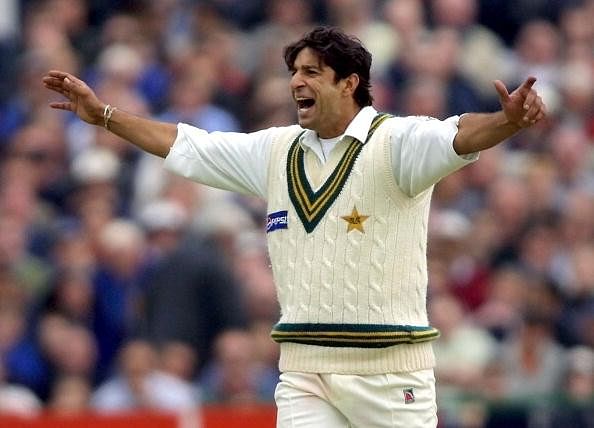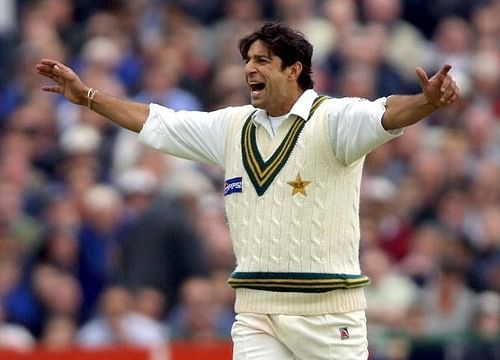
How Wasim Akram didn't let diabetes ruin his career
Wasim Akram was one of the greatest fast bowlers of the modern era and did amazing things with the cricket ball, which were pleasing to watch. His match-winning efforts for his team Pakistan helped them win a World Cup and made them a formidable unit away from home too.
During his great career, Wasim had to face a battle with diabetes. However, like the fighter he is, he won this battle against his biggest enemy yet. Let us see how Wasim overcame diabetes to remain a top-level international bowler deep into his career.
Initial phase of battle with diabetes
Wasim was first diagnosed with diabetes in 1997. The news had a terrible impact on Wasim who was only 29 at that time. He was really down and depressed after the news, and it took him nearly six weeks to get out of it. Wasim had once commented on this issue:
“I was diagnosed with diabetes in 1997. I was only 29 years old. I thought my life was gone — no more cricket. But, my wife gave me mental strength. It’s just mental discipline. Temptations are there. I feel like having biryani every night — naans and kulchas, and niharis. But I avoid it.”
“I will eat in moderation and now my brain has programmed itself in a way that if I eat slightly more, I start feeling like I’m bloating. I feel I’m going to throw up. So with mind discipline you can do anything. It’s tough to start off with it but once you start feeling healthy, everything works for you then. Health is everything.”
Clearly there was a lot of personal sacrifice. Wasim had to make to win the fight against diabetes and continue to thrive as a top bowler at the international level. In particular, he made a lot of change to his food habits and programmed a comprehensive exercise schedule for him to stay fit. Let us have a look at those changes he made.
Changes in diet and exercise schedule by Wasim to stay fit for international cricket
Wasim had to cut out and reduce a lot of heavy stuff from his food, including high carb food and oily stuff. Also, he increased the proportion of vegetables and salad in his diet to ensure he felt full and stop fast food cravings.
Wasim commented on his diet changes:
“In Urdu-Hindi we say ‘kam khao to zindagi lambi jayegi’ (eat less and you’ll live longer). It’s a habit. For example, I don’t eat bread at night because there are more carbs in it. If I feel like it, I’ll have half a roti. I’ll have a chicken tikka, but I’ll have a massive bowl of salad.”
“And then I check my sugar levels. I’ve trained my mind. I love my steaks, but I just eat less, at home or otherwise. Before lunch, I eat a bowl of stir fried vegetables so my stomach is more or less full. And then I’ll have a little of whatever else is there. So that’s the sort of technique I’ve used to train myself.”
“I do the same thing wherever I am. I can have something before the meal — something healthy, something non-sugary¸ maybe a fruit. When I travel, I need to check the levels at regular intervals due to time difference and eating times.”
Wasim also incorporated regular exercise as part of his daily schedule to keep burning the calories and avoiding weight gain. He commented on his exercise schedule after the diagnosis:
“Exercise for diabetics is most essential. In our culture, we were told diabetics get tired. But why? Because their sugar levels are not in control. When your sugar is not in control, your muscles are not getting the right amount of glucose. That’s why you feel weak.”
“I’ve proved it wrong. I’ve played cricket for ten years in the national cricket and I’ve been running around these last ten years day in and day out, exercising every day twice a day. Exercise is very crucial, and regularly checking sugar levels when under stress, when not well, if you’re too happy — it fluctuates.”
“If it’s [sugar level] a bit high after dinner, then I go for a half-hour walk and when I come back and check, I see it’s gone down. If you’ve got to go for a job at 9 am, get up at 6.30 am, sleep early. In our culture, we don’t sleep early. I eat by 7.30-8 pm. I sleep by 10.30-11 pm. Wake up at 6 am with my kids and then go for my run.”
“So, these small details are what you need to learn yourself. I’ve never let it hamper my playing. I got diagnosed in 1997 and retired in 2003 and I got 200-plus wickets in one-day and in test cricket after being diagnosed. I’ve not tired still.”
An inspiration for the next generation of sportsmen and common public alike
Wasim Akram has fought a successful battle with diabetes and managed to have a very successful career long after his disease. He is definitely an inspiration for young sportsmen facing similar issues to fight on and win.
Wasim has also raised awareness amongst the common public facing diabetes about the importance of diet, exercise and discipline to fight the ailment. Hope that more people can become aware of ways to fight against this illness and lead a happy and balanced life.

